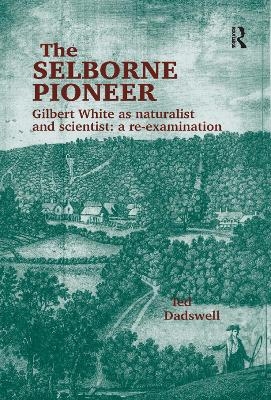
The Selborne Pioneer
Gilbert White as Naturalist and Scientist: A Re-Examination
Seiten
2018
Routledge (Verlag)
978-1-138-37820-9 (ISBN)
Routledge (Verlag)
978-1-138-37820-9 (ISBN)
Gilbert White's name is known universally but, as Ted Dadswell insists in this book, important aspects of his work have frequently been overlooked even by scholarly editors. The Selborne naturalist (1720-1793) has been described as 'a prince of personal observers'; but a shrewd analytical questioning and comparing was also typical of his 'natural knowledge'. Exceptional even in his general aims, White studied the behaviour, the 'manners' and 'conversation', of his animals and plants. He saw, moreover, that an animal or plant and indeed a parish such as his own, was unitary in operation; again and again, a cause had numerous effects and an effect numerous causes. Observation could go forward in circumstances such as these, if one was both sharp-eyed and patient, but how could true investigation be managed? How could a particular cause or effect be isolated or tested? Here what Dadswell calls White's 'comparative habit' was put to good use. Gilbert White was a careful keeper of records, and using these comparatively he 'appealed to controls' while examining his living creatures. Questioning and testing even the 'entirely usual', White was brought back repeatedly to the notion of adaptability. His zoological findings often concerned 'changed or changing' animals (or birds) and their social and inter-personal relationships. Today, we can seem particularly well placed to appreciate his methods and factual claims; our 'ethologists' and ecologists have - seemingly - corroborated much of what he did. And yet just this corroboration renders him the more mysterious. To properly assess White as naturalist, we must be able to approach him not only scientifically but also historically. He hoped for the emergence of teams of behavioural workers but did not try to pre-empt what would be achieved only by such teams, and while he 'saw with his own eyes', as his friend John Mulso says, he was substantially affected by certain of his contemporaries and predecessors. His journals and notebooks show us the naturalist at work. When a perhaps unexpected combination of influences is allowed for, his 'unique' activities can be at least partially explained.
Ted Dadswell was educated at Collyer's School, Horsham and Durham University. After a period of teaching in the North East he moved to London in 1975, since when he has worked as a freelance historian and editor. He now lives in East Oxford.
Contents: Preface; The heroic gardener; Nature as an 'economy'; The 'outdoor' method; The disappearing 'swallows'; Behaviour; birds and other animals; Instinct and initiative; Behaviour; plants and insects; The useful naturalist; Science, meteorology and geology; The problem of adaptation; 'Living manners'; The perennial naturalist; Appendixes: Dissection of a live dog; Bird migration as a fact; Reports of 'torpid' swallows; The sin of cruelty; Design in shell-bearing animals; Bibliography; Index.
| Erscheinungsdatum | 21.01.2019 |
|---|---|
| Verlagsort | London |
| Sprache | englisch |
| Maße | 156 x 234 mm |
| Gewicht | 453 g |
| Themenwelt | Geschichte ► Allgemeine Geschichte ► Neuzeit (bis 1918) |
| Geisteswissenschaften ► Geschichte ► Regional- / Ländergeschichte | |
| Naturwissenschaften | |
| ISBN-10 | 1-138-37820-8 / 1138378208 |
| ISBN-13 | 978-1-138-37820-9 / 9781138378209 |
| Zustand | Neuware |
| Haben Sie eine Frage zum Produkt? |
Mehr entdecken
aus dem Bereich
aus dem Bereich
Europa 1848/49 und der Kampf für eine neue Welt
Buch | Hardcover (2023)
DVA (Verlag)
48,00 €
Giordano Bruno - ein ketzerisches Leben
Buch | Hardcover (2024)
C.H.Beck (Verlag)
29,90 €
Kunst und Gesellschaft an der Schwelle zur globalen Welt
Buch | Hardcover (2024)
Klett-Cotta (Verlag)
42,00 €


